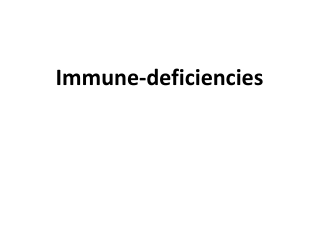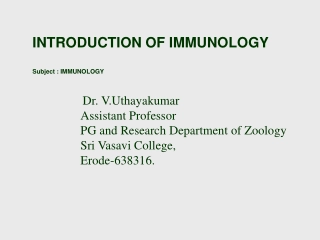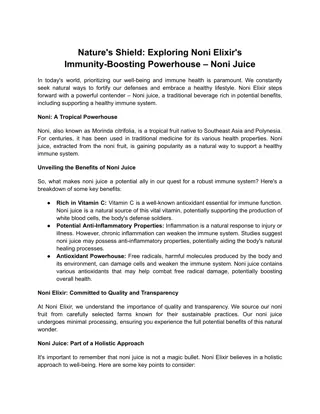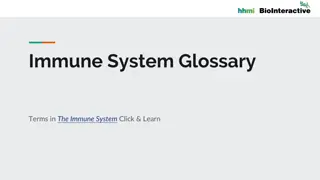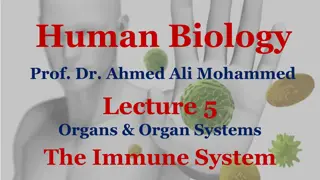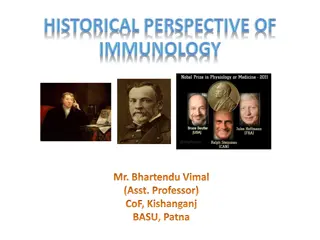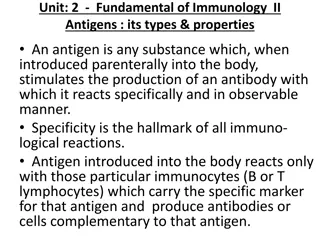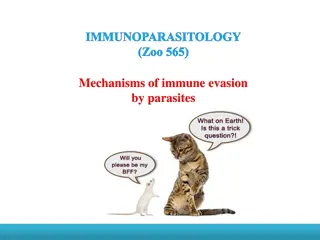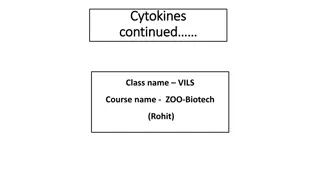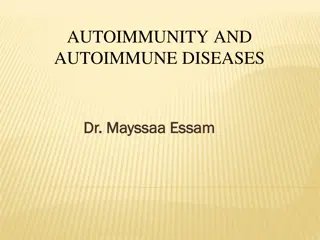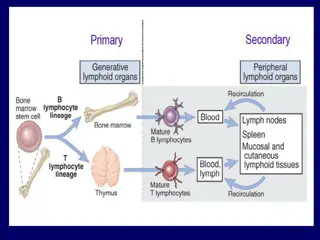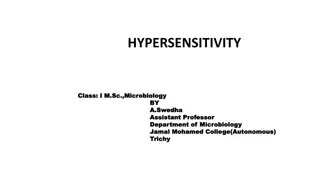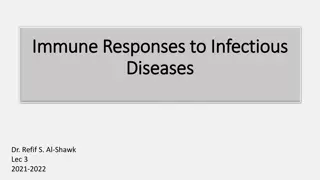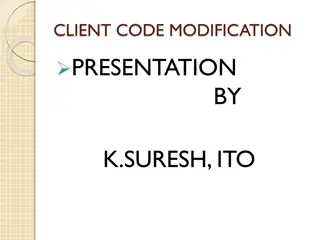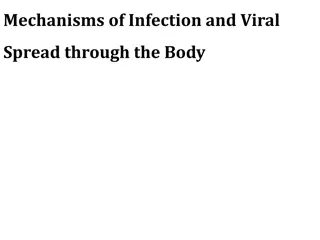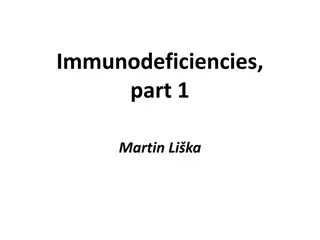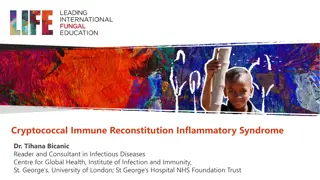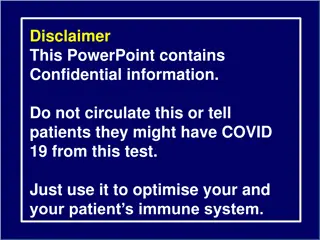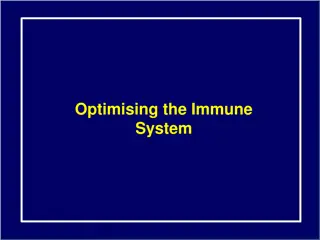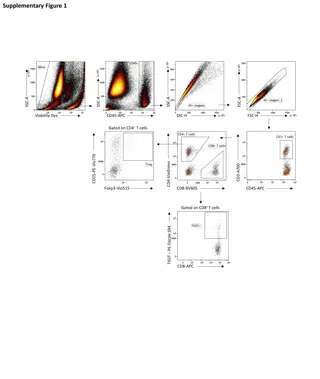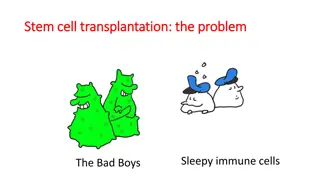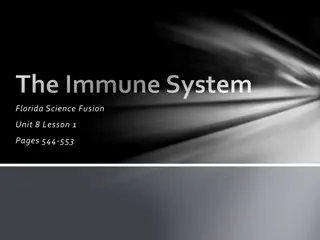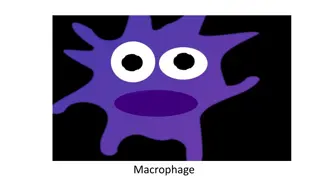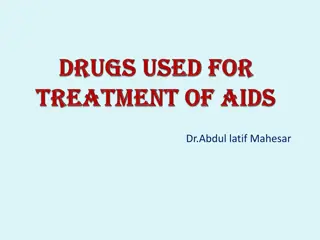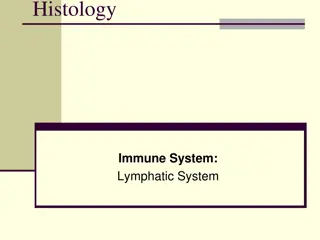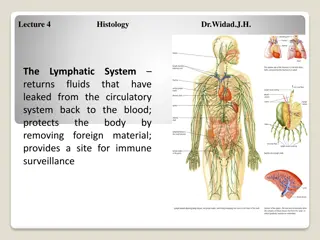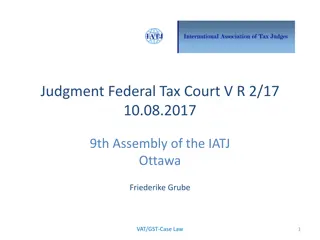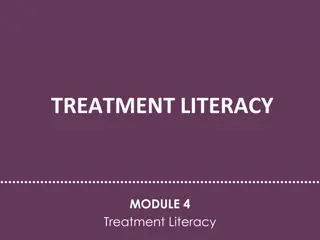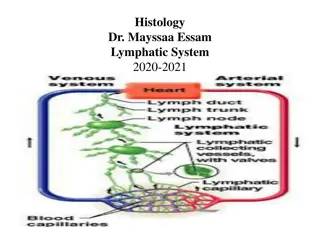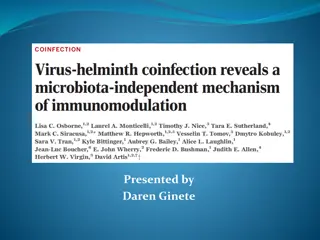Immune-deficiencies
Immune deficiencies can be classified into primary hereditary disorders based on clinical presentations, including cell-mediated, antibody-mediated, non-specific, and complement activation deficiencies. Major clinical manifestations of immune disorders range from B-cell deficiencies to phagocytic ce
2 views • 46 slides
INTRODUCTION OF IMMUNOLOGY
Explore the fundamentals of immunology with insights into immunogens, antigens, epitopes, and haptens. Uncover how these key components play vital roles in shaping immune responses and learn about paratopes, the basis of immunogenicity, and the key events that determine foreignness in the immune sys
0 views • 15 slides
Overview of Enforcement Initiatives and Outcomes at National Conference of Enforcement Officers
Delve into the insights shared at the National Conference of Enforcement Officers on 4th March 2024, focusing on enforcement initiatives such as National Special Drive, actions by the Centre and State, technology interventions, and policy changes. Uncover details on fake billing structures, motives
3 views • 32 slides
National GST Enforcement Officer’s Conference. 4th March,2024
The State Tax Department of Uttarakhand has organized the National GST Enforcement Officers Conference and has been actively involved in enforcing taxation regulations and conducting investigations. They have a well-structured enforcement setup with mobile units and special investigation branches to
1 views • 21 slides
Understanding Immune Thrombocytopenia (ITP) and Its Impact
Immune Thrombocytopenia (ITP) is a rare autoimmune disease where the immune system wrongly attacks platelets, leading to low platelet count. It can affect individuals of all ages, with symptoms appearing post-virus, vaccination, or certain medications. ITP can result in fatigue, bruising, and bleedi
3 views • 30 slides
Nature's Shield_ Exploring Noni Elixir's Immunity-Boosting Powerhouse – Noni Juice
In today's world, prioritizing our well-being and immune health is paramount. We constantly seek natural ways to fortify our defenses and embrace a healthy lifestyle. Noni Elixir steps forward with a powerful contender \u2013 Noni juice, a traditional beverage rich in potential benefits, including s
0 views • 2 slides
Comprehensive Guide to Immune System Glossary Terms
Dive into the world of immune system glossary terms with definitions and visual aids. Explore key concepts such as immune cell activation, adaptive immune response, antibodies, antigens, and more. Understand the complex processes within the immune system through informative images and concise explan
1 views • 70 slides
Understanding the Immune System: Organs, Functions, and Importance
The immune system acts as a defense mechanism against pathogens and infections, comprising various organs, such as the bone marrow, thymus, spleen, white blood cells, antibodies, complement system, and the lymphatic system. It works to recognize and destroy harmful microbes, maintaining the body's h
1 views • 23 slides
Overview of Immunology: From Historical Perspectives to Modern Techniques
Immunology is the study of the immune system, its functions, and responses to various stimuli. The field traces back to ancient times, with historical figures like Thucydides and Edward Jenner contributing to its development. From innate immunity to adaptive responses, the immune system plays a cruc
0 views • 29 slides
Understanding Antigens and Immunogens: Types and Properties
Antigens are substances that stimulate the production of antibodies in the body, exhibiting specificity in immune reactions. They interact with immune response products like antibodies, BCRs, and TCRs. Immunogens induce detectable immune responses, leading to antibody production or T cell activation
1 views • 30 slides
Mechanisms of Immune Evasion by Parasites in Immunoparasitology
Understanding how parasites evade the immune system of their hosts is crucial in the field of immunoparasitology. Parasites have developed various strategies such as anatomical seclusion, antigenic variation, and intracellular living to avoid host immune responses. Examples include Plasmodium within
0 views • 26 slides
Understanding the Significance of Cytokines in Immune Response
Cytokines play a crucial role in immune response activation and regulation. They are secreted by various cell types like lymphocytes, monocytes, and macrophages, exerting diverse biological functions, including immune system development, inflammatory response induction, and hematopoiesis regulation.
2 views • 12 slides
Understanding Autoimmunity and Autoimmune Disorders
Autoimmunity refers to the immune system's failure to recognize its own cells, leading to attacks on self-tissues. Autoimmune disorders encompass over 80 chronic illnesses where the immune system mistakenly targets organs. These disorders are poorly understood and recognized, impacting various organ
1 views • 20 slides
Immune Response Regulation and Autoimmunity Overview
The immune system maintains a balance through tolerance mechanisms to prevent autoimmunity. Central and peripheral tolerance play crucial roles in immune unresponsiveness to self-antigens. Failure in immune regulation can lead to autoimmune diseases like diabetes and lupus. Vaccination, discovered b
0 views • 18 slides
Understanding Hypersensitivity Reactions in Immunology
Hypersensitivity in immunology refers to an altered immune response against antigens, leading to hyperreactivity and immunopathology. This article delves into the different categories of adaptive hypersensitivities, focusing on Immediate (Type I), Antibody-Mediated Cytotoxic (Type II), and Immune Co
0 views • 6 slides
Immune Responses to Parasitic Infections and Evasive Strategies by Protozoan and Helminth Parasites
Parasitic infections pose complex challenges to the immune system due to the diverse nature of parasites, including protozoans and helminths. Protozoan parasites move between arthropod vectors and mammalian hosts, requiring both humoral and cell-mediated immune responses. Meanwhile, helminths, as mu
0 views • 15 slides
Understanding White Blood Cells and the Immune System
Explore the intricate details of white blood cells (WBCs), their types, functions, formation, and crucial role in defending the body against infections. Delve into the immune system, comprising barriers, cells, tissues, and organs that combat invaders, with a focus on innate and adaptive immunity. L
0 views • 65 slides
Understanding Anti-Inflammatory Foods and Immune Function
Our health is closely linked to the gut microbiome, with fiber playing a key role in feeding beneficial gut bacteria. Incorporating anti-inflammatory polyphenols from plant-based sources like fruits, vegetables, and herbs can promote a healthier gut. Additionally, fermented foods act as natural prob
1 views • 8 slides
Client Code Modification and Tax Evasion: Regulatory Issues in Stock Exchanges
Client Code Modification (CCM) is a service provided by Stock Exchanges to rectify errors in client codes during trading hours, but it has been misused for tax evasion by some brokers. Investigations revealed significant modifications leading to tax evasion. Regulatory bodies like SEBI and CBDT have
0 views • 41 slides
Understanding Mechanisms of Viral Infection and Spread
Viral infection involves a replicative cycle within the host, leading to a range of cellular responses from no apparent effect to disease. Factors such as virulence genes, host characteristics, and viral genome influence the pathogenicity and virulence of a virus. The process includes entry into the
0 views • 16 slides
Understanding the Importance of the Immune System for Homeostasis
Explore the intricate workings of the immune system, from its component parts and defense mechanisms to the significance of homeostasis maintenance. Discover how non-specific and specific immune responses, phagocytosis, neutrophils, natural killer cells, and interferons play vital roles in protectin
0 views • 32 slides
Understanding Immunodeficiencies: Classification, Frequency, and Types
Basic immunological terms explain the functions of the immune system, including defense against infection, homeostasis, and immunological surveillance. Immunodeficiencies are disorders of the immune system that impair its ability to carry out these functions. They can be classified into humoral, cel
0 views • 39 slides
Understanding Cryptococcal Immune Reconstitution Inflammatory Syndrome
Cryptococcal Immune Reconstitution Inflammatory Syndrome (C-IRIS) is a condition where rapid reversal of immunodeficiency triggers exaggerated inflammatory reactions in response to Cryptococcus antigens. It can manifest as either Unmasking IRIS or Paradoxical IRIS, with common CNS presentations incl
0 views • 10 slides
Understanding Immunotoxicity in Fish: An Alternative Model for Toxicological Studies
The study explores the immunotoxic effects of industrial effluents on fin fish, highlighting xenobiotics' impact on the immune system. It discusses the sensitivity of the immune system to environmental toxins and the elicitation of immune reactions by various substances. The importance of fish as a
0 views • 25 slides
Optimizing Immune System Through Holistic Approach
This PowerPoint presentation contains confidential information on optimizing the immune system to enhance overall health. It outlines a holistic approach involving neurological organization, meridian testing, and spectroscopic emission to support well-being. The content emphasizes the importance of
0 views • 27 slides
Understanding Immune System Optimization for COVID-19 Detection
Exploring a unique method of detecting potential COVID-19 cases by observing weakened responses to a specific colored acetate sheet emitting 633nm light. This approach, though not diagnostic, offers insights into immunity against the virus and recommends supplements like Liposomal Vitamin D3, Zinc,
0 views • 32 slides
Immune Cell Analysis Supplementary Figures
This collection of supplementary figures provides detailed flow cytometry data on immune cell populations, including CD4+ T cells, CD8+ T cells, tumor-associated macrophages, and more. The figures also include information on immune checkpoint molecules like PD-L1 and TIGIT. Each figure presents spec
0 views • 4 slides
Understanding Stem Cell Transplantation: Removing Sleepy Immune Cells and Fighting "The Bad Boys
Stem cell transplantation involves addressing the issue of immune cells failing to recognize and eliminate tumor cells, known as "The Bad Boys." By removing the dormant immune cells and replacing them with new ones from a compatible donor, the therapy aims to empower the immune system to target and
0 views • 8 slides
Understanding the Immune System: Defenses Against Pathogens
Delve into the intricate workings of the immune system as it fights off pathogens to protect the body. Explore how external defenses like tears, saliva, and skin, along with internal defenses like inflammation and white blood cells, work together to maintain homeostasis and safeguard against sicknes
0 views • 21 slides
Journey of Immune Cells in the Body
Explore the different stages of the immune response, starting with macrophages in the innate immune system that act fast without memory. Follow the path to the spleen and lymph nodes where T cells, already educated at birth to recognize specific antigens, await. Witness the intricate dance of the im
0 views • 18 slides
Impact of Audits on Tax Compliance: Insights from Research Studies
Studies conducted by researchers such as Erich Kirchler have explored the impact of audits on tax compliance. While audits generally have a positive effect on compliance, there are cases where they can backfire, leading to unintended consequences. High auditing levels may not always deter tax evasio
0 views • 14 slides
Understanding HIV and AIDS: Treatment and Progression
HIV leads to AIDS, a progressive immune system failure allowing life-threatening infections. Effective drugs can extend life by maintaining the immune system and preventing opportunistic infections. Various types of anti-retroviral drugs target different viral components to reduce viral load and mai
0 views • 29 slides
Understanding the Lymphatic System and Immune Response
The lymphatic system, a vital component of the immune system, consists of lymphocytes, plasma cells, and other cells within a framework of reticular cells and fibers. It includes lymphoid organs like the bone marrow, thymus, lymph nodes, and spleen. Diffuse lymphatic tissue and lymphatic nodules are
0 views • 20 slides
Overview of the Lymphatic System and Immune Response
The lymphatic system plays a crucial role in returning leaked fluids back to the blood, protecting the body from foreign materials, and supporting immune surveillance. It consists of lymphoid cells such as T and B lymphocytes, macrophages, dendritic cells, and reticular cells that work together to d
0 views • 31 slides
Dispute over VAT Liability in Car Purchase Case
Cartrader A bought cars from B Ltd., paid VAT, but B Ltd. didn't remit VAT. C involved in evasion. A held liable initially, successful appeal against VAT evasion assessment. Dispute over A's knowledge of C's intentions.
0 views • 10 slides
Understanding HIV/AIDS Treatment Literacy: A Comprehensive Guide
This educational module covers various aspects of HIV/AIDS treatment literacy, including disease progression, CD4 cells, antiretroviral therapy, opportunistic infections, and clinical monitoring. It explains the latent and advanced stages of HIV, the importance of maintaining a good immune system, a
0 views • 22 slides
Understanding HIV and AIDS: The Progression in Adult Natural History
HIV infection progresses in stages from acute infection with flu-like symptoms to a latency period of no symptoms, then advancing to AIDS where the immune system is significantly weakened, leading to opportunistic infections and HIV-related cancers. The virus targets CD4 cells, impacting the immune
0 views • 29 slides
Understanding the Lymphatic System: An Overview of Lymph Vessels and Functions
The lymphatic system plays crucial roles in maintaining fluid balance, immune response, and waste removal in the body. Comprised of lymphatic vessels and organs, this interconnected system transports lymph fluid from tissues back to the bloodstream. Lymph capillaries, lymph nodes, and larger collect
0 views • 22 slides
Understanding Helminths and Immunomodulation: A Comprehensive Study
Helminths, parasitic organisms affecting a large part of the global population, can modify the immune response through immunomodulation. This research delves into the interaction between helminths, microbiome, and immune response, exploring the effects on macrophages, alternative activation, and the
0 views • 28 slides
Lesson Outlines and Vocabulary for Chapter 17 Hollenbeck Middle School 8th Grade
Explore Chapter 17 lesson outlines, bell ringers, vocabulary, and review exercises for 8th-grade students at Hollenbeck Middle School. Topics cover communicable diseases, immune system defense, pathogens, sexually transmitted infections, and the effects of diseases like AIDS on the immune system.
0 views • 7 slides
